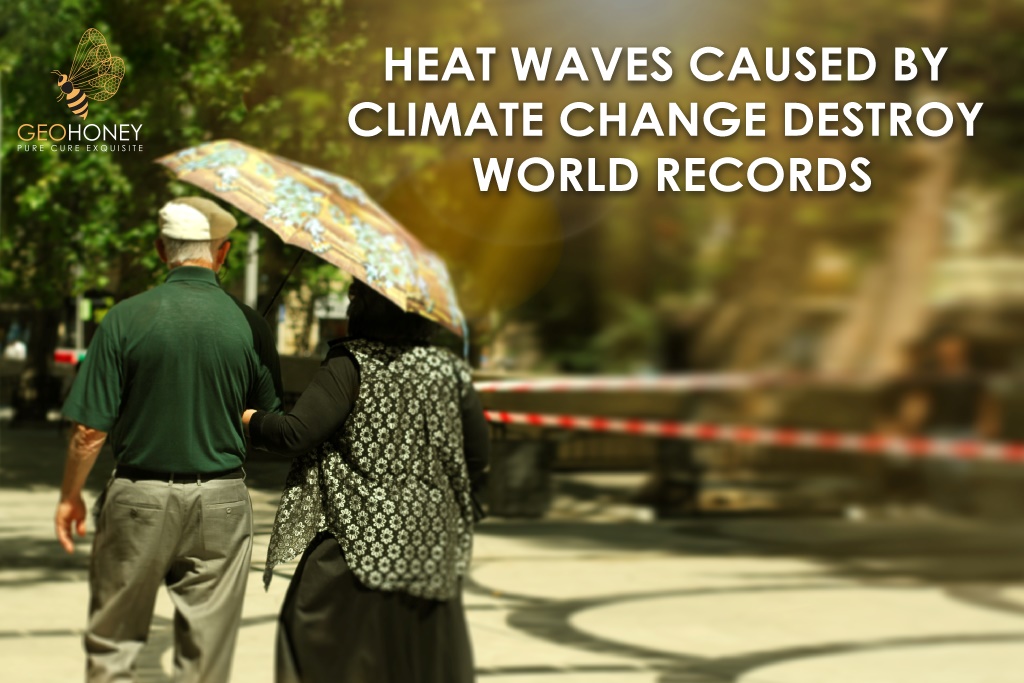- Tokyo: 03:32
- Singapore: 02:32
- Dubai: 22:32
- London: 18:32
- New York: 13:32
Heat Waves Caused By Climate Change Destroy World Records

CLIMATEWIRE | A record-breaking hot wave in the western Mediterranean last month would have been practically impossible to achieve if climate change had not been a factor, according to a new study.
Even with the assistance of global warming, it was a spectacular event. A heat wave of this scale should have a one-in-400 probability of occuring in any given year, according to statistics.
That's according to the most recent research from World Weather Attribution, a science programme that looks at the connections between climate change and extreme weather events. It's the organization's quickest study to date, having been issued barely a week after the Mediterranean heat wave passed.
The occurrence marked the beginning of the Northern Hemisphere's summer disaster season. Temperatures in portions of Portugal, Spain, Morocco, and Algeria surged in the final week of April, reaching levels not seen until the height of summer.
Portugal set a new national record for April heat with temperatures nearing 98.5 degrees Fahrenheit, and Spain set a new record with temperatures around 102 degrees Fahrenheit. Temperatures in Algeria reached 104 degrees Fahrenheit in certain places, shattering some local records, and Marrakech, Morocco, approached a record-breaking 106 degrees Fahrenheit.
Temperatures in the region rose around 20 degrees Fahrenheit above usual for this time of year.
These temperatures are "usually only seen in July and August, so they arrived at least two months earlier than usual," said Fatima Driouech, a scientist at Morocco's Mohammed VI Polytechnic University and a co-author of the new study, during a news conference announcing the new findings.
The new study investigated the extent to which global warming influenced the high heat using a combination of regional weather data and climate models. Models enable scientists to mimic a world without human-caused global warming and then compare it to the current environment.
The heat wave would have been at least 3.5 degrees Fahrenheit milder if climate change had not occurred, according to the study. Without the influence of global warming, such an occurrence would have been at least 100 times less likely to occur.
"It was a rare event in the current climate, but an event of this extreme would have been almost impossible in a colder climate in the past," said Sjoukje Philip, a climate scientist at the Royal Netherlands Meteorological Institute and another research coauthor.
At the same time, as the earth warms, excessive heat is expected to worsen over the region. The global temperature has already risen by more than 1 degree Celsius (more than 2 degrees Fahrenheit). If global warming exceeds 2 degrees Celsius, subsequent heat waves of similar magnitude in the Mediterranean will most likely be at least 1 degree Celsius (1.8 degrees Fahrenheit) hotter.
In general, climate models predict that as the planet heats, heat waves will become more frequent and intense.
According to research co-author Roop Singh, senior climate risk adviser at the Red Cross Red Crescent Climate Centre, this indicates international leaders should be planning for a hotter planet. Extreme heat is one of the world's deadliest natural catastrophes. It can be even more lethal early in the season, as it did last month.
"People at the end of April have not necessarily prepared their homes in terms of bringing out air conditioning or fans for heat," she explained.
And humans haven't yet acclimatised to extended hot weather in the same manner that they have later in the summer - they're just not prepared for the shock of a sudden intense heat wave.
However, early heat is hitting the rest of the world this year, not just the Mediterranean.
Last month, most of Asia experienced excessive heat, including Thailand, Vietnam, Laos, Myanmar, Bangladesh, and parts of China. On April 16, Dhaka, Bangladesh, experienced its highest temperature in nearly six decades, reaching 105.1 degrees Fahrenheit. Thailand's hottest temperature ever recorded was 114 degrees Fahrenheit on April 14 in the city of Tak.
April and May are frequently the hottest months in certain locations of South Asia. Nonetheless, this year's heat wave was one of the worst in recent memory, shattering records across the region.
This season has also seen an outbreak of extraordinary spring temperatures in North America. Temperatures in many parts of the United States rose by up to 20 degrees Fahrenheit above average last month, reaching the 90s in places like Arizona and Nevada. Temperature records fell across much of the country on a daily and monthly basis.
Other climate-related tragedies around the world have been compounded by the spring heat.
As mountain snow began to melt quickly due to high temperatures in California, flood warnings were issued. Due to flood dangers, Yosemite National Park was forced to close.
Meanwhile, much of the Mediterranean is experiencing severe drought, which is exacerbated by excessive heat. Droughts have reduced agricultural yields, especially wheat and barley crops.
"It emphasises the cascading effects that heat waves can have when combined with other hazards on the economy, livelihoods, and health," Singh added.
Source: scientificamerican.com



